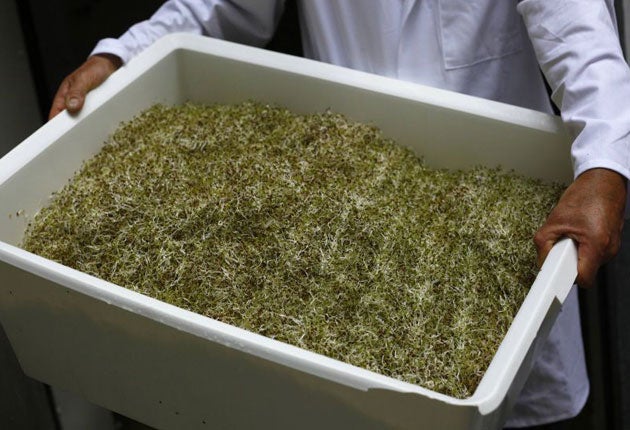Your support helps us to tell the story
From reproductive rights to climate change to Big Tech, The Independent is on the ground when the story is developing. Whether it's investigating the financials of Elon Musk's pro-Trump PAC or producing our latest documentary, 'The A Word', which shines a light on the American women fighting for reproductive rights, we know how important it is to parse out the facts from the messaging.
At such a critical moment in US history, we need reporters on the ground. Your donation allows us to keep sending journalists to speak to both sides of the story.
The Independent is trusted by Americans across the entire political spectrum. And unlike many other quality news outlets, we choose not to lock Americans out of our reporting and analysis with paywalls. We believe quality journalism should be available to everyone, paid for by those who can afford it.
Your support makes all the difference.The source of Germany's lethal food poisoning outbreak became a mystery again today after experts said there was no evidence linking it to beansprouts.
Previously the vegetables from an organic farm were suspected of harbouring the E. coli infection that has so far killed 22 people.
But the Lower-Saxony state agriculture ministry said 23 of 40 samples from the farm have tested negative for the highly aggressive, "super-toxic" strain of the bacteria. It said tests were still under way on the other 17 sprout samples.
"The search for the outbreak's cause is very difficult as several weeks have passed since its suspected start," the ministry said, warning that further testing of the sprouts and their seeds was necessary to achieve full certainty.
Negative test results on sprout batches now, however, do not mean that previous sprout batches were not contaminated.
The ministry's remarks about samples from the Gaertnerhof organic farm in the northern German village of Bienenbuettel left shoppers across the continent still puzzled as to what is safe to eat. The ministry itself also said it was not clear how soon an answer would be found.
"A conclusion of the investigations and a clarification of the contamination's origin is not expected in the short term," it said.
The current crisis is the deadliest known E. coli outbreak with more than 2,300 people falling ill across Europe.
Suspicion for the cause of the E. coli outbreak had initially fallen on contaminated cucumbers from Spain, but researchers then concluded that the cucumbers were contaminated with a different strain of E. coli.
Germany issued a warning against eating any beansprouts and kept up its earlier warning against eating tomatoes, cucumbers and lettuce.
In Germany alone, 2,231 people have been infected since May 2, with 630 of them suffering from a rare, serious complication that can lead to kidney failure.
Germany's national disease control centre said the number of serious complications was ten times the number of cases registered for all of 2010.
Preliminary tests had found that beansprouts from the Gaertnerhof Bienenbuettel farm could be traced to infections in five German states. Many restaurants had received deliveries of the beansprouts, which are often used in mixed salads.
Beansprouts have also been implicated in previous E. coli outbreaks, particularly one in 1996 in Japan, in which tainted radish sprouts killed 12 people and reportedly made more than 9,000 ill.
E. coli is found in the faeces of humans and livestock and can spread to produce through poor hygiene among farmworkers or animal waste in fields and in irrigation water.

Join our commenting forum
Join thought-provoking conversations, follow other Independent readers and see their replies
Comments